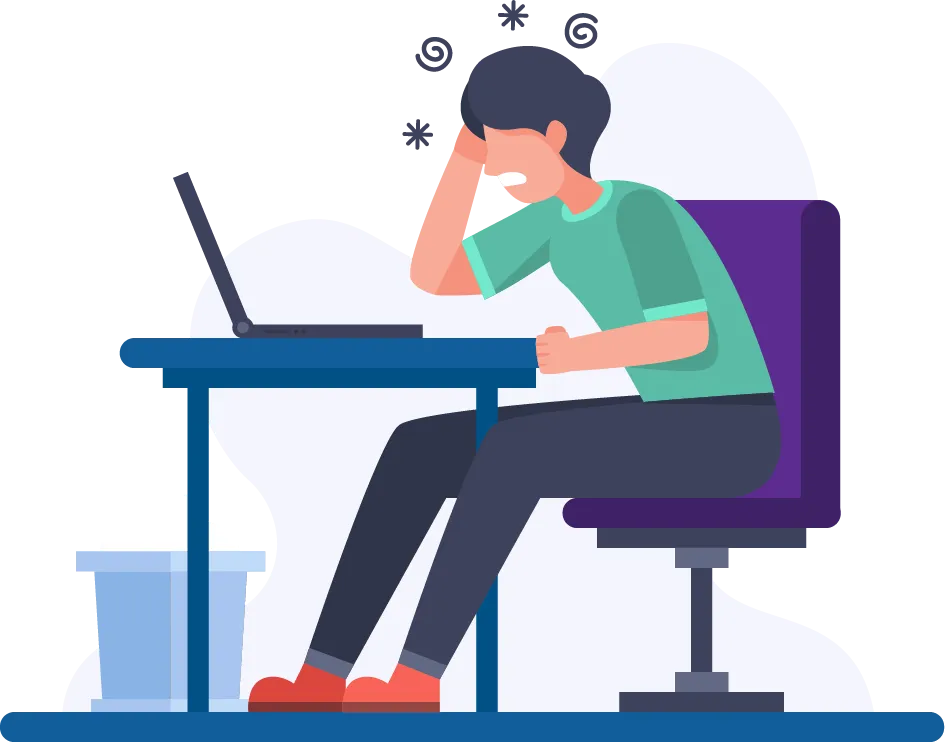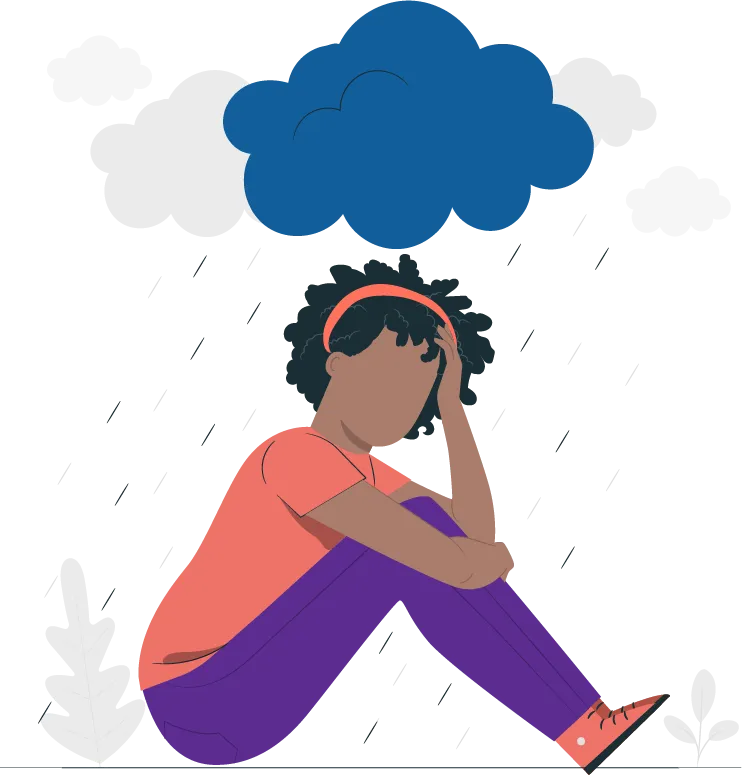Mental Wellness | 6 min read
How to Differentiate Between Feeling Low and Depression
Medically reviewed by
Table of Content
Key Takeaways
- It is normal to feel a range of negative emotions when you're feeling low.
- When negative emotions persist for a longer period of time, it may lead to depression.
- Be open to getting help from loved ones as well as assistance from a healthcare professional.
Sadness is a normal feeling. In fact, not to feel low when confronted with the loss of a loved one, for instance, would be a sign of something wrong. Like the changing of the seasons, during the ups and downs of life, it is natural to experience a range of feelings, including a variety of concurrent negative emotions. However, depression as a mental disorder occurs when feelings of sadness, anger, hopelessness, and lack of interest, to name a few, persist for a long period and disrupt your daily activities. It might be hard to deal with depression because it is much more than a mood disorder.
According to the WHO, this mental disorder is common. Over 264 million people globally suffer from it. Often, mental health isn’t given sufficient attention and isn’t treated on par with physical wellbeing. This is detrimental given the scale of mental diseases and the fact that it can, in fact, lead to suicide. The good news, however, is that there are ways to combat and conquer it. But first, it is key to know whether you are just experiencing a low spell emotionally or whether you have clinical depression.
Here is a short primer on depression to help you understand more about it, and take the necessary action.
What is depression?
It is a mood disorder that is characterised by feelings such as sadness, lack of interest, and hopelessness, which affect daily living. In fact, the depression definition offered by the American Psychiatric Association notes that depression negatively affects:
- How you feel
- How you think
- How you act
So, sadness is a normal feeling. In fact, not to feel low when confronted with the loss of a loved one, for instance, would be a sign of something wrong. Like the changing of the seasons, during the ups and downs of life, it is natural to experience a range of feelings, including a variety of concurrent negative emotions. However, when feelings of sadness, anger, hopelessness, and lack of interest, to name a few, persist for a long period and disrupt your daily activities, then you may be dealing with a mood disorder called depression. To be classified as clinical depression, these symptoms will be experienced for a prolonged period, at least 2 weeks. Moreover, the intensity of the symptoms and the type of disease may vary, meaning not everyone experiences it in the same way and not every form of depression is the same.
Here is more on the symptoms and types.
Symptoms of depression
The symptoms of depression are varied and while it is a mood disorder, its effects are also found in the way a person acts. The general signs and symptoms include:
- Continual sadness or a depressed, empty mood
- Hopelessness, worthlessness, guilt, and pessimism
- Lack of interest in hobbies and enjoyable activities
- Increased fatigue and decreased energy
- Unusual weight loss or gain
- Change in appetite
- Anxiety and difficulty concentrating
- Suicidal thoughts
- Drug or substance abuse
- Irregular sleep patterns, lack of sleep, and excessive sleep
- Physical pains and aches
- Reduced sexual desire
- Irritability, anger, and restlessness

In some people, the symptoms are mild. In others, they are more severe. Moreover, depression affects men, women, the young, and the old differently. For instance, the National Institute of Mental Health (US) notes that for
Women
Depression is more common, perhaps due to biological, hormonal, and lifecycle factors and common symptoms are sadness, worthlessness, and guilt.
Men
It tends to cause fatigue, anger, irritation, loss of interest in activities, sleep problems, and reckless behavior such as substance abuse.
Elderly People
The symptoms such as sadness and grief, may not be wholly apparent and other diseases may contribute to depression.
Young Children
Depression may cause behaviors such as feigned sickness, refusal to go to school, the need to always be with the parent, and thoughts about the loss of a parent.
Teens
Depression may cause or lead to irritation, anxiety, eating changes, sulkiness, substance abuse, and problems at school.
Types of depression
The 2 main types of depression are major depressive disorder (major depression) and persistent depressive disorder (dysthymia).
Major depressive disorder
It involves you experiencing at least 5 of the total symptoms, such as loss of interest, low mood, significant weight change, fatigue, anxiety, worthlessness, and indecision, for a period of 2 weeks. It is a severe type, may involve several episodes, and one cannot simply drive away from the symptoms.
Persistent depressive disorder
PDD is a milder form of depression, but it can cause more damage because for you to have PDD, you must have the symptoms for at least 2 years. In this 2-year period, you may experience episodes of major depression.
Some other types of depression are:
- Perinatal depression: Affecting women during/ after pregnancy
- Psychotic depression: Depression combined with psychosis, for instance, hallucinations
- Bipolar affective disorder: Episodes of depressive lows and manic highs interspersed with regular moods
- Seasonal Affective Disorder: In SAD, depression follows the course of the seasons
Causes of depression
The reasons can be varied, many, and are the subject of ongoing medical research. It could be caused by a combination of:
- Family history
- Childhood trauma
- Personality
- Presence of serious illnesses
- Drug abuse
- Biochemistry of the brain
- Environmental factors like poverty

Treatment of depression
The treatment, medically speaking, can start once a psychiatrist or psychologist diagnoses the condition as being clinical depression. A combination of medication and psychotherapy may be proposed. The medication could help with anxiety and psychosis. The psychotherapy sessions are meant to create new ways of dealing, thinking, and acting in response to negative feelings. If these are not an option, brain stimulation therapy may also be suggested.
Your healthcare professional may also suggest treatments/ methods such as:
- Meditation
- Exercise
- Supplements
With medication and lifestyle modifications it is possible to fight and treat it. What you do not want to do is let the condition go on for weeks, months, and years without addressing it.
If you think you have clinical depression, a good thing to do is acknowledge what you are going through and then, avoid the temptation of self-isolation. This would mean openness to getting help from loved ones as well as assistance from a healthcare professional. For the latter, you can access the healthcare platform provided by Bajaj Finserv Health and search for a relevant psychiatrist or psychologist near you. Then, you can book an appointment online, e-consult a specialist over video or make a physical visit to a clinic near you.
With healthcare at your fingertips, you have an easy way of knowing if what you’re feeling is simply part of the normal experiences of life or a case of clinical depression. Once you have a diagnosis done, take small but sure steps towards a cure.
References
- https://www.who.int/news-room/fact-sheets/detail/depression
- https://www.who.int/news-room/fact-sheets/detail/depression
- https://www.psychiatry.org/patients-families/depression/what-is-depression
- https://www.nimh.nih.gov/health/publications/depression/index.shtml
- https://www.psychiatry.org/patients-families/depression/what-is-depression
- https://www.healthline.com/health/depression#types
- https://www.mayoclinic.org/diseases-conditions/depression/symptoms-causes/syc-20356007
- https://www.healthline.com/health/meditation-for-depression#benefits
- https://www.psychiatry.org/patients-families/depression/what-is-depression
- https://www.healthline.com/health/depression/how-to-fight-depression#step-back
- https://www.psychiatry.org/patients-families/depression/what-is-depression
- https://www.healthline.com/health/depression
Disclaimer
Please note that this article is solely meant for informational purposes and Bajaj Finserv Health Limited (“BFHL”) does not shoulder any responsibility of the views/advice/information expressed/given by the writer/reviewer/originator. This article should not be considered as a substitute for any medical advice, diagnosis or treatment. Always consult with your trusted physician/qualified healthcare professional to evaluate your medical condition. The above article has been reviewed by a qualified doctor and BFHL is not responsible for any damages for any information or services provided by any third party.





